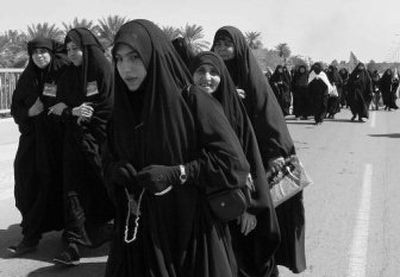More than 115 pilgrims die

BAGHDAD, Iraq – More than 115 Shiite pilgrims were killed in a coordinated series of attacks across Iraq on Tuesday, a wave of violence on the eve of one of Shiite Islam’s most sacred holidays that appeared intended to widen Iraq’s sectarian divide.
A Sunni insurgent group asserted responsibility for the carnage, which occurred three weeks into a U.S. and Iraqi effort to bring security to Baghdad and other parts of the country.
The attacks came a day after nine U.S. soldiers were killed in two roadside bombings, one of which was the deadliest single strike against U.S. ground troops this year. The U.S. military is deploying 21,500 additional troops, mainly in Baghdad, to enforce the security plan.
The roadside bombings, in Diyala and Salahaddin provinces, illustrated the continuing vulnerability of U.S. soldiers, who have been killed in recent weeks by anti-aircraft weapons, powerful armor-piercing roadside bombings and sniper fire.
In the northern Iraqi city of Mosul on Tuesday, armed men broke into a prison and freed 140 inmates, many of whom were suspected Sunni insurgents, said Husham al-Hamdani, the head of the security committee in Ninewa province.
The worst attack against Shiites happened shortly after 4 p.m. on a major road in the central city of Hillah as two male suicide bombers detonated vests packed with explosives near a tent for pilgrims. They were headed to Karbala to mark the Arbaeen, the end of the 40-day commemorative period of mourning for one of Shiite Islam’s holiest figures.
“We ran away because suddenly dust went up in the air from the middle of the crowd and there were people flying with it,” said Muhammad Hassan, 29, a pilgrim who was wounded in the back. “We were seeing corpses, heads, limbs flying around; dead children and women. Women were screaming and weeping, children were crying.”
The bombings in Hillah killed at least 77 people and injured more than 125. Nine other attacks targeting pilgrims elsewhere in the country left at least 41 people dead, according to Lt. Col. Abdullah Salman, a spokesman for the Iraqi Ministry of Interior.
Thousands of Iraqis embark on a pilgrimage to Karbala this time of year to mourn Imam Hussein, the prophet Muhammad’s grandson. Many travel dozens of miles on foot as a sacrifice to Hussein.
A spokesman for the Islamic State of Iraq, a Sunni insurgent group, called the attacks “more successful than we had expected.” The official, Abdul Rahman al-Ghrairy, said the attacks were part of a campaign to avenge the alleged rape of a Sunni woman by Shiite policemen in late February.
Al-Ghrairy said in a phone interview that two Saudi volunteers carried out the Hillah bombings and that the target was a son of Shiite politician Abdul Aziz al-Hakim. Al-Ghrairy’s claim could not be independently confirmed, and there were no reports that al-Hakim’s son was at the scene of the blasts.
Al-Hakim is the leader of the Supreme Council for the Islamic Revolution in Iraq, the country’s largest political party.
Most of the large-scale attacks against U.S. troops and Iraqi civilians since the Feb. 14 inception of the Baghdad security plan appear to have been committed by Sunni insurgents. Shiite militias, meanwhile, including the powerful Mahdi Army led by anti-American cleric Muqtada al-Sadr, appear to have scaled down their violence.